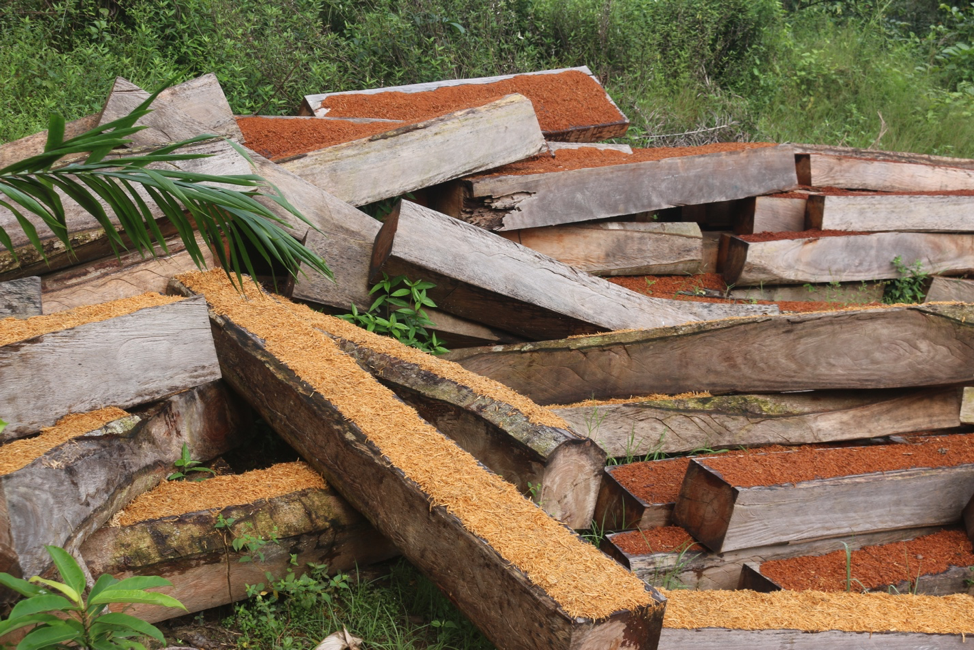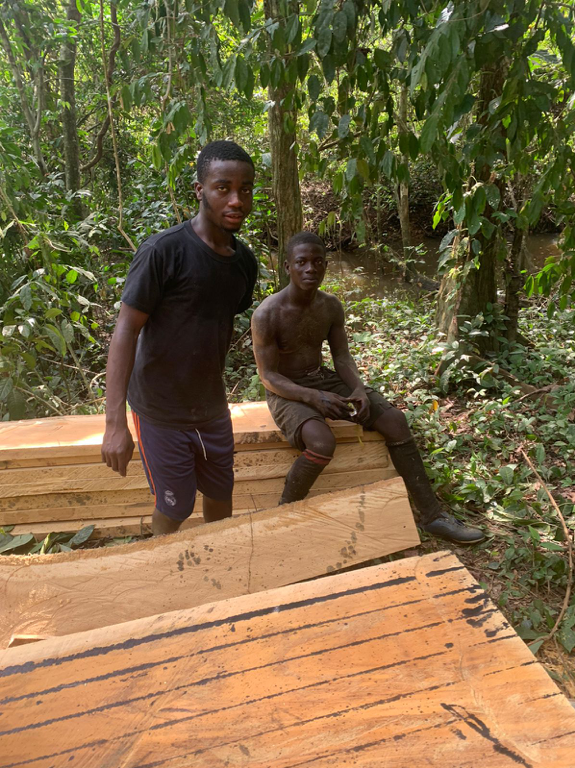Top: Timber illegally harvested by Binta Bility in a forest in Compound Number One, Grand Bassa County. The DayLight/James Harding Giahyue
By Emmanuel Sherman
Editor’s Note: This is the second of a two-part series that exposes illegal logging operations conducted by a businesswoman.
COMPOUND NUMBER ONE, Grand Bassa County – Binta Bility, a businesswoman whose illegal logging activities were first exposed two months ago, has promised to work in the confines of forestry laws and regulations. But it may not be that easy, as she has to account for the wrongdoing she has committed.
Bility has been producing timber for months in Bassa. Last month, her consignment of 79 illegal timber was seized by police in the Nimba town of Bahn. A ranger with the Forestry Development Authority (FDA) had noticed that the woods were oversized and stopped the transport.
Bility had insisted she was doing the right thing, labeling The DayLight as “fronting to promote confusion and instability among forest-dependent communities” in the Analyst newspaper. However, in a complete turnaround, she has admitted that her activities are unlawful.
“From now on, I will do everything legally,” Bility told The DayLight in a WhatsApp interview about the woods seizure and her other illegal activities. “I don’t intend to do anything illegally.”
Just before the arrest in Bahn, Bility had continued with her illegal activities. She had sealed a deal with villagers in Teemor, Grand Bassa, not far from the site of her initial operations in Compound Number One. She signed an agreement with locals to harvest 500 pieces of boxlike timber, commonly called “Kpokolo” in exchange for L$45,000. Three hundred has already been produced, with a thickness of nearly five and a half and eight inches, and seven feet long.
In a one-sided article in the Analyst newspaper over a month after the investigation, Bility claimed The DayLight was misleading the public and accused the online newspaper of instigating confusion in forest-dependent communities. She, however, offered no proof to back that accusation. “My pit-sawing activity, which is far from logging activities, continues to bring relief to rural dwellers,” she said in the article at the time.

But those claims were wrong because pit-sawn or chainsaw-milled woods are different from the ones Bility produced. She initially lied that she was not the person harvesting timber in that area but somersaulted after the publication profoundly proved it was her. Fondly called “Mammie” by locals, she had worked there as a chainsaw miller for several years before shifting to kpokolo earlier this year. Under the Chainsaw Milling Regulation, planks must be at most two inches thick, 12 inches wide and 14 feet long. The thicknesses of the Kpokolo she produces are two and four times the legal size for planks. It sometimes takes an entire football team to lift them. The regulation was introduced to bring chainsaw milling on par with the best forestry practices, including sustainability, legality and community benefits.
“I will resize all those woods to two inches,” Bility said, blaming her previous activities and previous comments on the lack of awareness of the regulations. “We have already started resizing them.” She then provided a photograph of two young men milling two-inch planks in a forest, she said, in Grand Bassa.
While Bility’s pledge may be good, it does not matter to the woods in the hands of the police in Nimba. Retrieving the timber will take a court order, according to the Regulation on Confiscated Logs, Timber and Timber Products.
Yanquoi Dolo, the head of the FDA legal team, said the police were investigating Bility’s operations in Nimba. “The wood there is important evidence,” Dolo told The DayLight.
Size aside, the source of Bility’s timber in Grand Bassa also renders them illegal, a graver offense. The woodland where they were harvested falls within the Worr Community Forest. Covering 35,337 hectares, the forest is contracted to Magna Logging Corporation. Magna transferred its right to operate the forest to Masayaha Logging Company, a Lebanese firm, more than three years ago.
The townspeople interviewed said they told Bility about this situation but both parties forged ahead with their deal. While Bility saw Teemor as an opportunity to extend her logging activities, local chiefs and elders took advantage of the situation for their own benefit.
Masayaha has failed to build or repair roads, schools and clinics, and it owes locals land rental, log-harvesting and scholarships fees. Apart from that, the community does not know about Masayaha’s takeover of their agreement with Magna, a violation of the Community Rights Law of 2009 with Respect to Forest Lands. Masayaha has cut logs outside the forest, even though it abandoned a good number of the ones it felled in the community forest. Brewing tension led to a protest in October.
“The company let us down and we don’t know what to do. So, we are just trying to find means,” said Daniel Goee, assistant town chief of Norr Town, where the timber was illegally harvested.
“We want to use the percentage to maintain our road ourselves,” added Teleco Lincoln, a spokesman for the youth in that area.

Morley kamara, Magna’s owner and CEO, did not return queries emailed to him. Despite being mandated by law to grant public access to logging information, Kamara had asked The DayLight not to contact him anymore following our series on his company and Masayaha’s unlawful deals.
Bility denies being told of the Magna-Masayaha agreement and insists “I am not working in any company’s forest.”
But there is no justification for an illegal deal in forestry, and whether or not Bility was aware of Masayaha’s complicated agreement does not undo the harm already done. Harvesting in another company’s contract is prohibited, and Bility faces a fine, a six-month prison term, or both a fine and imprisonment under the confiscated timber regulation. Her punishment could be a US$25,000 fine and a year of imprisonment, according to the National Forestry Reform Law.
Yei Neagor, the FDA regional officer responsible for Grand Bassa, Nimba and River Cess, declined to comment on the matter. Neagor, who helped expose a firm’s illegal logging activities in River Cess and was promoted to her current position shortly after that, had investigated Bility’s initial operations in Compound Number One but no actions have been taken against the businesswoman.
Dolo, the FDA’s lawyer, said the FDA was investigating Bility’s operations in Bassa and would make a statement on Friday.

This story was a production of the Community of Forest and Environmental Journalists of Liberia (CoFEJ).




